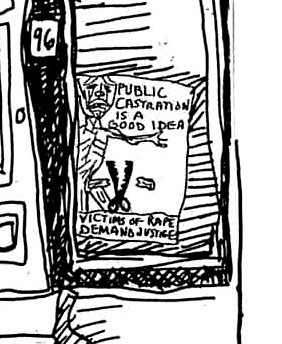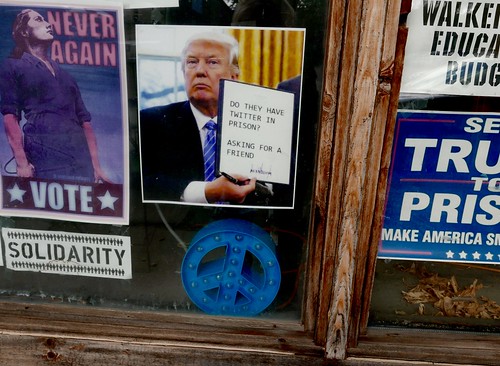1. It's about to start. I'll update this post as we go.
2. Dr. Christine Blasey Ford has taken her seat. She's nervously looking around, getting patted on the back. She's wearing a dark blue jacket over a dark blue top and has her hair done in a way that allows it to fall over her face and to need to be pushed back. Senator Grassley begins by apologizing to both Blasey and Kavanaugh for the incivility to which both have been subjected. He says he intends to preserve civility in the hearing and to make it "comfortable" for both witnesses.
3. Grassley criticizes Democrats for sitting on the allegations, allowing them to leak out belatedly, and failing to resolve matters in a bipartisan way. Democrats, he says, are to blame for the pain that "Dr. Ford" has suffered in recent days. He praises himself for doing he could to accommodate her. (I put "Dr. Ford" in quotes to indicate that's what she is being called here. I had switched to calling her "Blasey" after reading in the NYT that she preferred that name. From here on, I'll write "Dr. Ford" without quotes.)
4. Dianne Feinstein: "She wanted it confidential, and I held it confidential,
up to a point..."
5. Feinstein casts an aspersion on Grassley: He didn't introduce Dr. Ford. Grassley, angered, interrupts to say that he didn't forget to introduce her. He was going to introduce her at the point when he was inviting her to begin speaking.
6. Still waiting for Feinstein to finish reading her intro statement. Dr. Ford seems to be struggling to keep her composure. After Feinstein, I presume we will hear Dr. Ford read
this statement, already released to the press.
7. "I am here today not because I want to be.
I am terrified...." she begins, in a creaky voice.
8. Sorry, but I got an hour and a half behind. Will resume.
9. Now, I've watched the entire opening statement by Dr. Ford. She seemed very credible to me. Though she was reading, she seemed to be reliving a real, traumatic experience. It's hard to imagine that she could be infusing her speech with that kind of emotion phonily. Even an excellent actress would have difficulty affecting that kind of emotion.
10. Rachel Mitchell, the prosecutor brought in to ask questions for the Senators, receives 5 minutes of time from Senator Grassley. Mitchell's use of the time is awkward, because she begin with documents that Ford must read and comment on, and Ford takes her time and makes small corrections to the documents. Grassley interrupts to say his time is up, and shifts the proceedings forward to the next Senator, Dianne Feinstein,
11. Feinstein takes her turn and focuses on the difficulties Ford experienced as her name became known. This material bolsters Ford's credibility, especially to the extent that it seems that Ford knew how painful this exposure would be before she decided to go public. Feinstein's time runs out quickly and Mitchell gets another 5 minutes to continue where she left off.
12. Mitchell's approach enables Ford, just by being careful, to slow everything down. The time will run out. The day will end. Maybe Kavanaugh supporters wanted it to play out like that, but Ford is a credible person, and I think the Republicans chosen approach, including the use of Mitchell, will backfire on them, and Kavanaugh will not be confirmed. I'm saying this at 11:06 ET in my recording, that is, an hour before I'm writing this update.
13. At 11:13 ET, Ford speaks of the "indelible" memory of Kavanaugh and Judge laughing — "having fun at my expense." "I was underneath one of them, while the 2 laughed, 2 friends having a really good time with one another."
14. At 11:56 ET, during the questioning by Senator Whitehouse, I exclaim aloud: "The Democrats are winning by
a lot here." Whitehouse is talking about the lack of an investigation.
15. Grassley gets angry and yells — about why there is no new investigation — but it feels so wrong that he's yelling in the presence of Dr. Ford. She's the allegedly traumatized victim — don't yell around her! The Republicans are either too bland — operating through Mitchell — or irksomely angry — through Grassley. Do they know how badly they are losing right now? I wonder how Brett Kavanaugh is doing.
16. I'm skipping ahead, looking to see if Kavanaugh's testimony has begun. It has not. I talk with Meade for a while about what Kavanaugh might say if he were asked if he is 100% certain that Ford is wrong when she says she's 100% certain that Brett Kavanaugh did what she remembers. Here's what I imagined Kavanaugh saying: I cannot be 100% certain. I know that I drank far too much on some occasions when I was an immature teenager, and though I've said that I don't remember ever suffering alcohol-induced amnesia, I cannot know for an absolute certainty that it never happened. Watching Dr. Ford testify has been a horrific experience for me. What if there is a blank, dark spot in my memory where drunken young Brett Kavanaugh did what Dr. Ford describes? I pray to God that's not true, but I cannot say 100% that it's not true, and if it is, I am so terribly sorry. I beg Dr. Ford's forgiveness. I hope for God's forgiveness. I hope that my life's work as a sober adult makes up for what I may have done all those years ago. I still believe I have devoted and useful service to give to my country, and I humbly submit myself to your vote, Senators. And I thank all of you for considering my case, and I want Dr. Ford to know that my heart goes out to her, and my heart goes out to every victim of sexual assault. Thank you.
17. I picture Trump watching the hearings with Ivanka. Somehow I imagine Ivanka reacting like me. I wonder what they are saying to each other. Remember that Trump said at his press conference yesterday that he would watch and judge Dr. Ford for himself, that he had an open mind about it, and he could "believe anything."
18. I've been listening to Kavanaugh for a long time without stopping to write anything. Let me quickly say that I'm finding his opening statement extremely powerful and persuasive.
19. It was a long day! Let me try to wrap up this post. I thought Kavanaugh did really well in his written statement, expressing strong outrage and real emotion. In the questioning, this demeanor sometimes felt too strong. He interrupted and shouted back and seemed to show some hate and contempt for some of the Senators. He said more than once that his family had been "destroyed," and yet his wife is his "rock." The rock is not destroyed.
20. This was the ultimate he said/she said. Both were tremendously strong and they told diametrically opposed stories. If I had to decide, I would not go by who's more likely to be telling the truth, but how everything we've heard weighs on the question whether or not to confirm. In view of everything we know about Kavanaugh, does he deserve confirmation even with the degree of doubt we have about something terrible he might have done when he was 17 (and a couple of other, much weaker allegations)? I suspect most people will end up in the same position they had on him anyway, because it's a matter of weighing. But when I think about how BK and CBF could be so far apart, I have 3 explanations: 1. BK has some alcohol blackout holes in his memory, and what CBF remembers is in one of them, 2. CBF has a false memory and really believes it (caused by some genuine trauma), 3. BK has no route but forward, and he knows he did it, but feels entitled to what he's worked all his life to attain. Since there's no way back to his old life, he must force his way through this obstacle. And he's barreling ahead to save his life and save his family. Cornered, he had to fight like hell, and that includes lying.



















